What I do every week
| Site: | Herzlich willkommen auf der Seite der QUA-LiS NRW |
| Course: | [Q23] At home |
| Book: | What I do every week |
| Printed by: | Gast |
| Date: | Wednesday, 4/02/26 |
Description
1. Vocabulary - What I do every week
| Picture | English | German | In context | Notes |
|---|---|---|---|---|
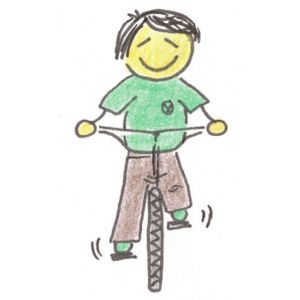 |
to ride a bike |
Fahrrad fahren | Akira likes to ride his bike. | Write something that helps you to learn. |
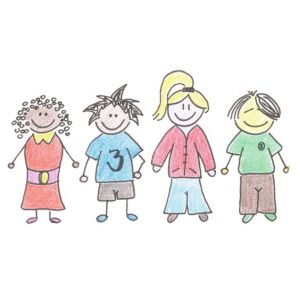 |
to meet friends |
Freunde treffen | Joyce meets her friends in a park on Sundays. | |
 |
to surf the internet |
im Internet surfen | Children love to surf the internet. | |
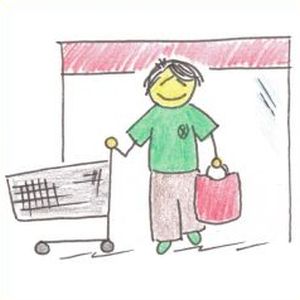 |
to go shopping |
einkaufen gehen | Akira goes shopping in a supermarket every Friday. | |
 |
to cook |
kochen | Noah cooks for his mother every Sunday. | |
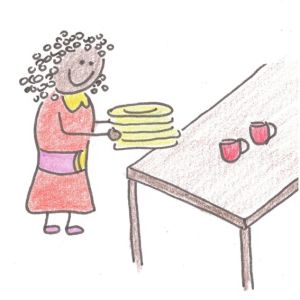 |
to lay the table |
den Tisch decken | Every evening Joyce lays the table at home. | |
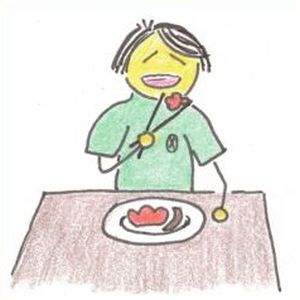 |
to eat |
essen | Akira loves to eat. | |
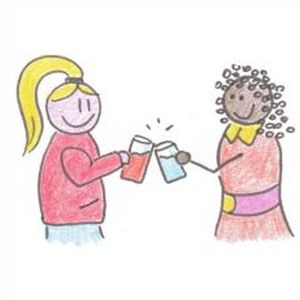 |
to drink |
trinken | Joyce and Nina often drink fruit juice. | |
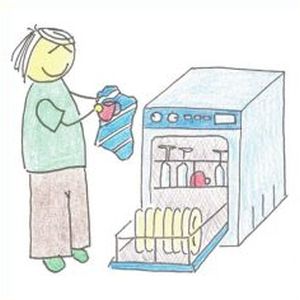 |
to empty the dishwasher |
die Geschirrschpülmaschine ausräumen | After school Akira always empties the dishwasher. | |
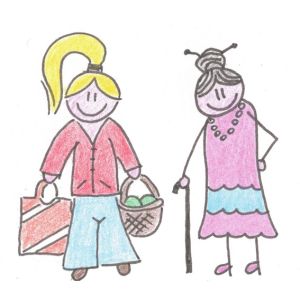 |
to help grandma |
Oma helfen | Nina often helps her grandma. | |
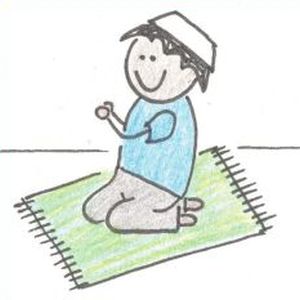 |
to pray |
beten | Noah prays every day. | |
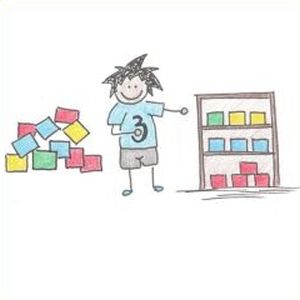 |
to tidy up my room |
mein Zimmer aufräumen | He tidies up his room after school. | |
 |
to do my homework |
meine Hausaufgaben machen | Nina does her homework every day. | |
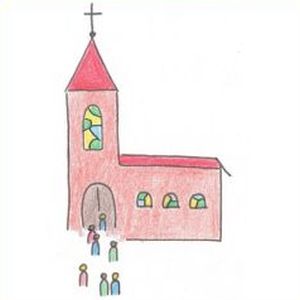 |
to go to church |
in die Kirche gehen | Every Sunday we go to church. | |
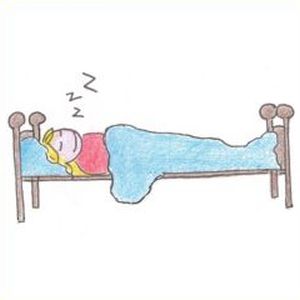 |
to sleep |
schlafen | She sleeps at eight o'clock. |
1.1. Dialogue Cards
1.2. Flashcards
1.3. Find the pairs
learningapps.org: Cookies
1.4. Find the pairs *
learningapps.org: Cookies
1.5. Memory
Find the correct pairs. Finde die passenden Paare.
learningapps.org: Cookies
1.6. Dictation * - Words
1.7. Dictation ** - Sentences
1.8. Paraphrasing (optional)
Paraphrase* three words from this lesson in the dictionary.
Follow these steps:
Step 1: Read two or three entries in the dictionary as an example.
Step 2: Find words that belong to the topic and that are not yet in the dictionary.
Step 3: Create a new entry in the dictionary in the category "At home".
Step 4: Write the word and its German translation in the title.
Step 5: Paraphrase* the word in the dictionary.
Step 6: Write an example sentence with the word.
Extra-Step (creative): If you want, you can add a picture to your entry. You can draw something or take a picture.
Watch the tutorial if you need help.
* "Paraphrasing" means that you explain the vocabulary in your own words for someone who doesn't know it, e.g. "A sneaker is a shoe that you wear for sports."
Erkläre drei Wörter aus dieser Lektion für das "dictionary".
Führe folgende Schritte aus:
Schritt 1: Lies zwei oder drei Einträge im "dictionary" als Beispiel.
Schritt 2: Finde Wörter, die zum Thema gehören, aber noch nicht im "dictionary" stehen.
Schritt 3: Erstelle einen neuen Eintrag für die Kategorie "At home".
Schritt 4: Schreibe das englische Wort und die deutsche Übersetzung in den Titel.
Schritt 5: Erkläre das Wort im "dictionary".
Schritt 6: Schreibe einen Beispielsatz mit dem Wort.
Extra-Schritt (kreativ): Wenn du möchtest, kannst du ein Bild ergänzen. Du kannst etwas zeichnen oder ein Foto machen.
Schau dir das Tutorial an, wenn du Hilfe benötigst.
2. Grammar - Simple present
Simple Present Einfache Gegenwart
📝 rule:
You use simple present when you talk about habits and things that happen regularly.
Das Simple Present benutzt du, wenn du über Gewohnheiten sprichst oder wenn etwas regelmäßig stattfindet.
💡 form:
| I | verb |
| you | |
| we | |
| you | |
| they |
| he | verb | +s |
| she | ||
| it |
✏️ example:
| I play football every week. | Ich spiele jede Woche Fußball. |
| You play tennis on Sundays. | Du spielst sonntags Tennis. |
| We play cards every evening. | Wir spielen jeden Abend Karten. |
| You play computer games every weekend. | Ihr spielt an jedem Wochenende Computerspiele. |
| They do their homework every day. | Sie machen jeden Tag ihre Hausaufgaben. |
|
📌 Remember! He, she, it - the "-s" must fit. |
|
| He plays the guitar every day. | Er spielt jeden Tag Gitarre. |
| She plays football every Monday. | Sie spielt jeden Montag Fußball. |
| It plays with a ball. | Es spielt mit einem Ball. |
⚠️ Watch the spelling!
1. If the verbs ends with "-ch" or "-sh", you must add "-es" after he, she, it.
Endet das Verb auf "-ch" oder "-sh", hängst du bei he, she, it ein "-es" an.
| We watch TV. | He watches TV. |
| I wash the car. | She washes the car. |
2. The verbs do and go change into "does" and "goes".
Die Verben do und go werden zu "does" und "goes".
| They do their homework. | She does her homework. |
| You go shopping. | He goes shopping. |
3. If the verb ends with a consonant+ -y, it changes into "-ies".
Endet das Verb auf consonant+ -y, lautet die Endung "-ies".
| I tidy up the room every evening. | She tidies up the room every evening. |
| You never empty the dishwasher. | He never empties the dishwasher. |
💥 Signal words:
every week, in the morning, every Sunday, on Mondays, never, always, ...
2.1. Choose the correct verb form
learningapps.org: Cookies
2.2. Sort into groups
learningapps.org: Cookies
2.3. Write sentences
learningapps.org: Cookies
2.4. Crossword
learningapps.org: Cookies
2.5. Gap text - Nina's day
learningapps.org: Cookies
2.6. Gap text - Nina's day **
learningapps.org: Cookies
3. Vocabulary - In the calender
| Picture | English | German |
In context |
Notes |
|---|---|---|---|---|
 |
Monday |
(der) Montag | the 1st day of the week | Write something that helps you to learn. |
 |
Tuesday |
(der) Dienstag | the 2nd day of the week | |
 |
Wednesday |
(der) Mittwoch | the 3rd day of the week | |
 |
Thursday |
(der) Donnerstag | the 4th day of the week | |
 |
Friday |
(der) Freitag | the 5th day of the week | |
 |
Saturday |
(der) Samstag | the 1st day of the weekend | |
 |
Sunday |
(der) Sonntag | the 2nd day of the weekend |
| Picture | English | German | In context | Notes |
|---|---|---|---|---|
 |
day |
(der) Tag | Monday is the first day of the week. | Write something that helps you to learn. |
 |
week |
(die) Woche | A week has seven days. | |
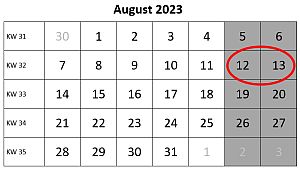 |
weekend |
(das) Wochenende | The friends meet at the park every weekend. | |
 |
month |
(der) Monat | A year has twelve months. | |
 |
year |
(das) Jahr | A year has 365 days. |
| English | German | In context | Notes |
|---|---|---|---|
every |
jede / jeder / jedes / jeden | I eat lunch every day. | Write something that helps you to learn. |
| on Mondays |
montags | Akira plays football on Mondays. |
|
| always |
immer | At my grandma's I can always eat chips. | |
| sometimes |
manchmal | I sometimes eat ice-cream when it is cold outside. | |
| often |
oft | Nina often helps her grandma. | |
| usually |
normalerweise | I usually do my homework after lunch. | |
| never |
niemals | Noah likes hip hop. He never listens to rap music. |
3.1. Dialogue Cards
3.2. Flashcards
3.3. Sorting
learningapps.org: Cookies
3.4. Sorting *
learningapps.org: Cookies
4. Creative task - Your week
Write 10 sentences about what you do every week in the At home-WIKI. If you need more words, look them up in the dictionary or use the internet to translate.
Schreibe 10 Sätze darüber, was du jede Woche machst ins At home-WIKI. Wenn du mehr Vokabeln benötigst, schaue im Wörterbuch oder benutze das Internet für die Übersetzung.
5. Grammar - negative statements simple present
If you want to to say that somebody does not do something, you must use "to do":
Wenn du sagen möchtest, das jemand etwas nicht tut, dann musst du "to do" verwenden:
| positive statement: | They | go | to town. |
| negative statement: | They | don't go | to town. |
("don't" is short for "do not")
3rd person singular:
| positive statement: | She | goes | to town. |
| negative statement: | She | doesn't go | to town. |
("doesn't" is short for "does not")
In English you always need an auxiliary verb for the "not". Never add the "not" to the main verb!
Im Englischen braucht man immer ein Hilfsverb für die Verneinung. Du darfst nie das "not" an das Hauptverb hängen!
5.1. Multiple choice - doesn't or don't
learningapps.org: Cookies
5.2. Correct the statement
learningapps.org: Cookies
5.3. Write sentences
learningapps.org: Cookies
5.4. Translate
learningapps.org: Cookies
6. Grammar - Questions simple present
There are two different kinds of questions:
Es gibt zwei verschiedene Fragearten:
1. yes-no questions:
You ask a question with Do or Does at the beginning of the sentence and the main verb after the subject:
Du stellst Fragen mit Do oder Does am Anfang des Satzes und dem Hauptverb hinter dem Subjekt:
Does Akira like homework? - Yes, he does. / No, he doesn't.
Do the children meet in the park? - Yes, they do. / No, they don't.
You can only answer yes or no. The answers are "short answers". Here you only need the auxiliary verb.
Du kannst nur mit Ja oder Nein antworten. Die Antworten sind "Kurzantworten". Du brauchst nur das Hilfsverb.
2. Wh-questions:
For more information you put a wh-question-word (where, when, who, what or why) at the beginning of the question:
Um mehr Informationen zu erhalten, setzt du ein Fragewort an den Anfang der Frage:
WHAT does Akira like? - Akira likes HIS BIKE.
WHEN do the children meet? - They meet AT THREE O'CLOCK.
6.1. Multiple choice - short answers
learningapps.org: Cookies
6.2. Find the pairs - Yes-no questions
learningapps.org: Cookies
6.3. Fill in - Short answers
learningapps.org: Cookies
6.4. Ask questions - Wh-questions **
learningapps.org: Cookies
6.5. Find the pairs - Questions and answers
learningapps.org: Cookies
6.6. Form questions
learningapps.org: Cookies
6.7. Translate **
learningapps.org: Cookies
7. Grammar - Mixed bag simple present
Every tense in English has got some typical signal words (adverbs of time) which only go with this one tense.
Jede Zeitform in Englisch hat ein paar typische Signalwörter (Zeitadverbien), welche nur zu dieser einen Zeitform passen.
Adverbs of time (Zeitadverbien): every Monday, every year, every ..., on Mondays, ...
📝 rule:
You put the adverb of time at the end of the sentence:
Du fügst das Zeitadverb am Ende des Satzes ein:
✏️ examples:
positive statement: The friends meet in the park every Sunday.
negative statement: The friends don't meet in the park every Sunday.
yes-no question: Do the friends meet in the park every Sunday?
wh-question: Where do the friends meet every Sunday?
Adverbs of frequency (Häufigkeitsadverbien): never, sometimes, usually, often, always, ...
📝 rule:
You put the adverb of frequency in front of the verb:
Du fügst das Häufigkeitsadverb vor dem Verb ein:
✏️ examples:
positive statement: The friends usually meet in the park.
negative statement: The friends don't ususally meet in the park.
yes-no question: Do the friends usually meet in the park?
wh-question: Where do the friends usually meet?
7.1. Memory - Questions and answers
learningapps.org: Cookies
7.2. Gap text - Nina and Susan
learningapps.org: Cookies
7.3. Make sentences **
learningapps.org: Cookies
7.4. Translate **
learningapps.org: Cookies
7.5. Creative task
What do you and your family do at the weekend? What don't you do at the weekend?
Choose one of the tasks and upload your results in At home-WIKI.
a) Write ten sentences about what you do and don't do at the weekend.
(-> positve and negative statements)
or
b) Write ten questions for a partner. What does he / she do at the weekend? What doesn't he / she do?
(-> y-n questions and short answers, Wh-questions and answers)